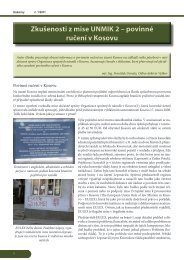TRADOC Pam 525-3-7-01 - TRADOC - U.S. Army
TRADOC Pam 525-3-7-01 - TRADOC - U.S. Army
TRADOC Pam 525-3-7-01 - TRADOC - U.S. Army
- No tags were found...
Create successful ePaper yourself
Turn your PDF publications into a flip-book with our unique Google optimized e-Paper software.
<strong>TRADOC</strong> <strong>Pam</strong> <strong>525</strong>-3-7-<strong>01</strong>Studies show domestic problems inthe home can result in decreased combateffectiveness and increased risk for deathon the battlefield. Soldiers who hadexperienced certain marital difficulties orstress in their personal relationships wereat especially high risk to suffer combatoperations stress reactions. 169 Concernsabout family well-being and a sense ofhelplessness will always exist in deployedSoldiers but if the family is properlyprepared to cope with separation andsupported by the family support network,then the Soldier will have the confidencethat they can manage independentlyfreeing the Soldier to concentrate on themission.Developing this level of confidence and trust presents a significant challenge to unit leaders.Military leaders must be able to assist Soldiers’ and families having trouble and at the same timeensure that the unit’s mission is accomplished. Leaders require the skill and knowledge to directSoldier and family members to military and civilian services designed to correct or mitigatefamily related stress. If ignored, family issues will adversely affect the Soldier’s performanceand reenlistment, and unit readiness and performance. 170 Leaders of units who respected andtrusted subordinates, made off duty time predictable, treated Soldier and family problems as unitproblems, and fostered family readiness groups, groups found that attention to family supportadded to the Soldier’s warfighting capabilities. 171The Soldier, the Family in the FutureIn the future operating environment, the structure of the <strong>Army</strong> and the way it trains andoperates will continue to evolve to meet new and unpredictable challenges. The <strong>Army</strong> willcontinue as all volunteer force. The majority of the <strong>Army</strong>, especially officers and NCOs, will bemarried. Demographic changes in the composition of the force are likely to include increases insingle parents and dual-career couples, and the increased requirement for family separations dueto deployments. Therefore, the demands on the <strong>Army</strong> and the family are likely to remainsignificant and family life stress will remain an important readiness issue.In recognition of these concerns, families will remain an important component of <strong>Army</strong>readiness policies and programs. Family issues affecting individual and unit readiness continueto play an important role in recruitment, retention, and commitment to the combat mission.Additionally, a strong healthy family life continues to be an important source of strength andsupport for Soldiers and their families and serves as a protective factor in preventing COSR.The <strong>Army</strong> has committed and will continue to commit substantial resources to family wellbeingprograms. These efforts reflect the view that family members are true partners in a161



